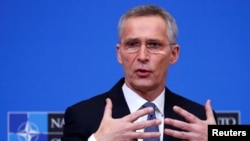NATO has agreed "in principle" to take over some of the training activities carried out by the U.S.-led coalition against the Islamic State terror group in Iraq, according to NATO Secretary-General Jens Stoltenberg.
"Today allied ministers reaffirmed our support to Iraq and agreed in principle to enhance NATO’s training mission," Stoltenberg said at a news conference Wednesday after a meeting of the alliance’s defense ministers in Brussels.
NATO’s chief said this would consist of handling some of the coalition’s current training, a direct response to demands from the Trump administration for European allies to do more in the Middle East.
Moments ahead of the announcement, U.S. Secretary of Defense Mark Esper told a small group of reporters that he felt confident NATO allies would increase their presence in Iraq, but that the move would take time.
The United States is hoping NATO partners will send additional forces to Iraq to allow some American forces to pull out. The change would not require more Western troops in Iraq and would have to be done with the consent of the Iraqi government.
“Obviously, the sooner the better for us,” Esper said en route to Brussels on Tuesday. “We all have a shared interest … ensuring the continued defeat of ISIS [Islamic State].”
The defense secretary wants to decrease U.S. force numbers in Iraq so that the troops can “go back to the states to increase their readiness or redeploy elsewhere in the Indo-Pacific.”
National strategy
Such a force posture shift would align with the Trump administration’s National Defense Strategy, which focuses on countering great-power competitors Russia and China by modernizing U.S. forces and increasing troops’ readiness for a high-end fight.
NATO’s current training mission in Iraq involves several hundred trainers from Allied countries and non-NATO partners such as Australia, Sweden and Finland.
It is unclear if leaders plan to expand the training mission by having more NATO partners go into Iraq, or by having the partners currently in Iraq provide additional NATO forces.
Esper is also looking beyond Iraq to see how NATO can provide Middle Eastern partners like Saudi Arabia with air defenses to “deter Iranian bad behavior.” He said Tuesday that he called on several NATO partners to assist in that effort following the attacks on Saudi facilities last year, and that he intended to press allies about this need again while in Brussels on Wednesday and Thursday.




